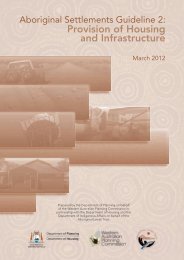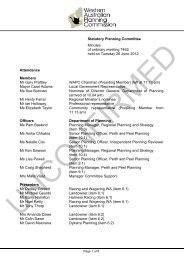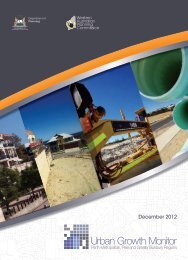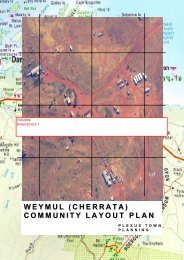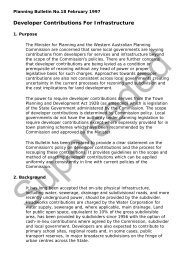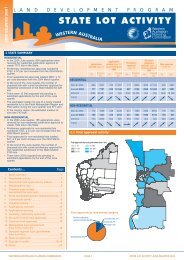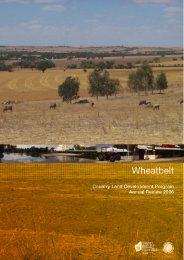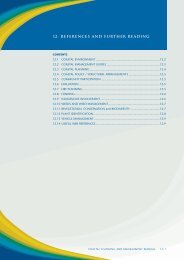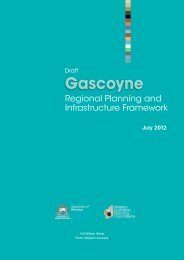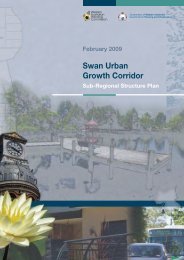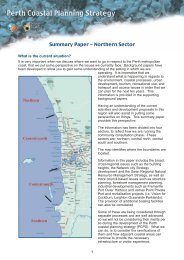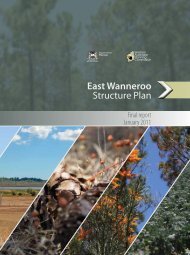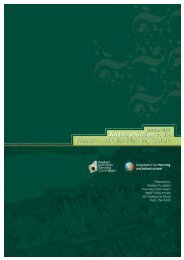Directions Paper - Western Australian Planning Commission
Directions Paper - Western Australian Planning Commission
Directions Paper - Western Australian Planning Commission
Create successful ePaper yourself
Turn your PDF publications into a flip-book with our unique Google optimized e-Paper software.
<strong>Directions</strong> <strong>Paper</strong> on the Integration of NRM and Land Use <strong>Planning</strong>5.6 Subdivision andDevelopmentThe subdivision and development of land are thelast stages of the planning approvals process.Subdivision and development of land canonly occur once land has been appropriatelyzoned, where it complies with the local planningscheme and policy provisions, and whenpreliminary planning such as structure planninghas been finalised.The <strong>Western</strong> <strong>Australian</strong> <strong>Planning</strong> <strong>Commission</strong>is the responsible decision making authorityfor subdivisions under the <strong>Planning</strong> andDevelopment Act 2005. The process forassessing subdivision applications is prescribedin the Act including statutory timeframes fordealing with applications. Once an applicationhas been received, the application is referred tothe relevant local government, service authoritiesand state agencies for comment over a 42 dayperiod. Once comments have been received adetermination is made by the <strong>Western</strong> <strong>Australian</strong><strong>Planning</strong> <strong>Commission</strong>. Determinations arerequired to be made within 90days or else theapplication can be considered refused by theapplicant and an appeal can be lodged. Inmaking a determination the <strong>Commission</strong> hasregard to the local planning scheme, localplanning strategy and state policy, and hasthe ability to place conditions on any approvalgiven. Applicants have the right to appeal arefusal or any condition made on an approval.Development applications are made to the localgovernment, unless development approval isrequired under a region scheme, in which casea development application is also required tobe submitted to the <strong>Western</strong> <strong>Australian</strong> <strong>Planning</strong><strong>Commission</strong>. Depending on the permissibility ofthe use proposed, applications may or may notbe required to be advertised for public commentand referred to relevant government agencies.Applications must be consistent with the localplanning scheme and local planning policiesand may be subject to conditions. An applicanthas the right of appeal should an application berefused or on conditions of approval.Conditions may be applied to both subdivisionand development approvals to ensuredevelopment is consistent with State and localplanning frameworks. In creating conditionsthere are a number of basic principles whichshould be applied to ensure the conditionsare valid and will be upheld in the case of anappeal. These include;1. The condition must have a planningpurpose. That is the condition must relateto relevant planning considerations andcannot address matters covered by otherlegislation.2. The condition must fairly and reasonablyrelate to the development being approvedand must support what has been appliedfor, not significantly change it. If significantchanges are required, the applicationshould be refused and a new applicationsubmitted. The condition should relateonly to the current application and notfetter any future decisions.3. The condition must be clear and final.With respect to the imposition of conditions,the WAPC has a list of standard subdivisionconditions that may be applied to subdivisionapprovals. This standard list is not definititive,however was introduced to ensure consistencyin requirements across the State. In additionmany agencies have standard advice andrecommendations that they provide inresponse to referrals from the WAPC and localgovernments regarding both subdivision anddevelopment applications. Discussions withthe relevant NRM agencies have expressedconcern that the standard conditions usedby the WAPC do not always adequatelyreflect the desired NRM outcomes. Similarly,concern has been expressed that the adviceand recommendations provided by the NRMagencies are not always able to be translatedeffectively into planning conditions as perthe basic principles above. It is thereforerecommended that a review be undertaken,both by the WAPC and relevant NRM agencies,of standard advice and conditions relevant toNRM.63



